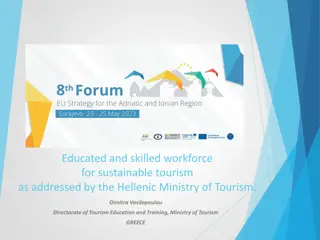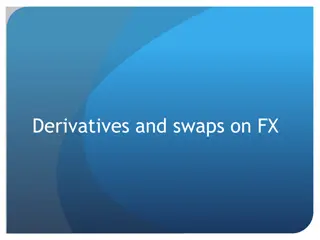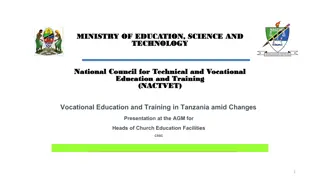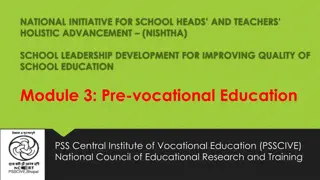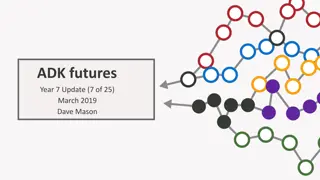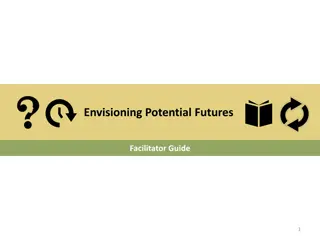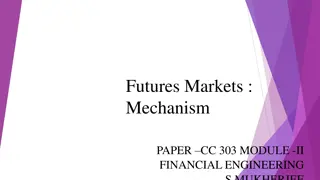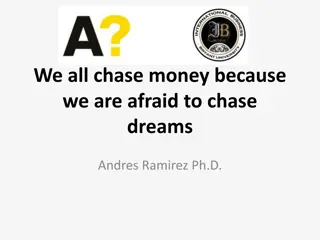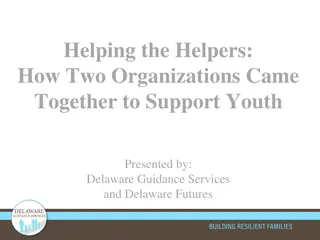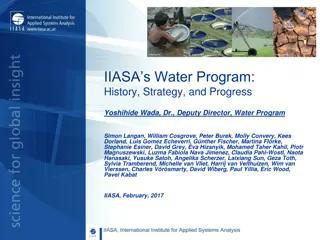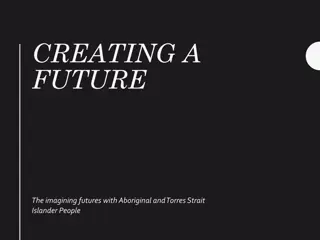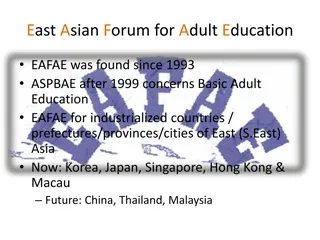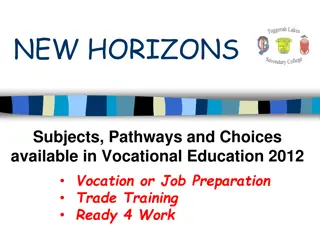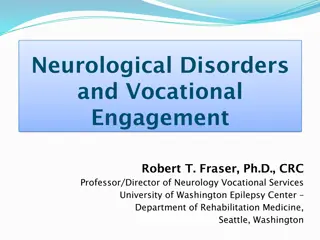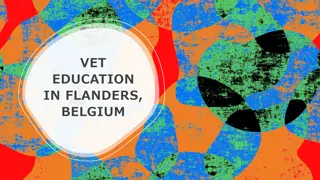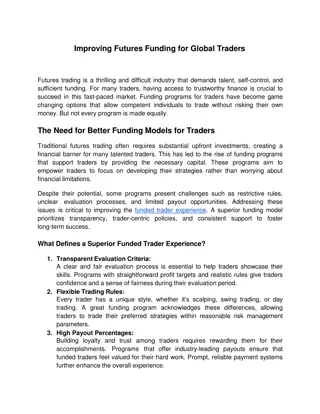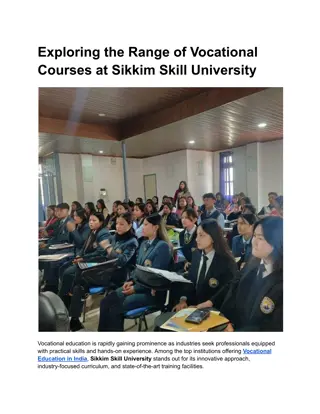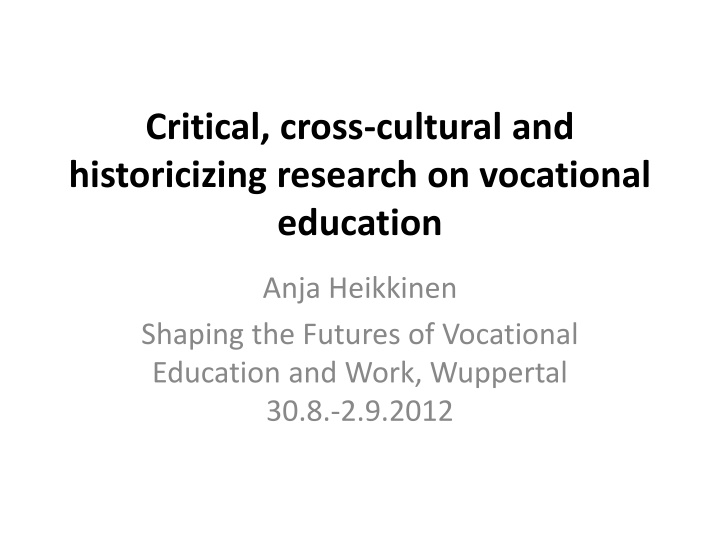
Shaping the Futures of Vocational Education
Research, Vocational Education, Globalization, Gender Roles
Download Presentation

Please find below an Image/Link to download the presentation.
The content on the website is provided AS IS for your information and personal use only. It may not be sold, licensed, or shared on other websites without obtaining consent from the author. If you encounter any issues during the download, it is possible that the publisher has removed the file from their server.
You are allowed to download the files provided on this website for personal or commercial use, subject to the condition that they are used lawfully. All files are the property of their respective owners.
The content on the website is provided AS IS for your information and personal use only. It may not be sold, licensed, or shared on other websites without obtaining consent from the author.
E N D
Presentation Transcript
Critical, cross-cultural and historicizing research on vocational education Anja Heikkinen Shaping the Futures of Vocational Education and Work, Wuppertal 30.8.-2.9.2012
1. Production of busnocracy & intelligentsia EURO(GLOBAL)BUSNOCRACY (=bureaucracy+business, cf. Marshall, Heikkinen ) Trans-nationalization of policies Globalization of industries Sectoral governance and industries Orders and paradigms of citizenship and occupational expertise Civic and occupational practices Production of civic and occupational paradigms and expertise Orders of knowledge in academy Trans-nationalization of research Globalization of HE markets EURO(GLOBAL)INTELLIGENTSIA 2
2. Questions and concerns How do forms (kinds), action fields and agency of education transform as historical, relational and connectional phenomena? What are planetary challenges of personal, collective and meta-collective growth? What do humanness and the humane reality culture mean in education? What is professionalism in education, who are in? Where is the place of research?
3.1. Examples, Genderqual: Summaries on gendered competences (Figueira & Salvador 2002) More typical men characteristics (Physical) Power Intrinsic interest in electrical phenomena and process Emphasise entertainment Better with heavy work Work more rationally Less emotional Less relaxed in social contact Less relaxed in acting with their bodies
More typical women characteristics *More industrious, More attentive Accept better routines, external controlled work More sensitive, More sweet- tempered More patient Better in taking care of children, Take care of the basic nursing Motherliness Better with dexterity work due to physical preconditions and patience Better with fine work, Work more precisely Work more emotionally Less original in mathematical and technical thinking Suspicions to adapt dirty, uncomfortable and heavy work
Summaries of gendered competences in Genderqual (Kampmeier 2002) More typical for women Advantages over men, strengths more industrious, more attentive accept better routines accept better external controlled work more sensitive, work more emotionally more sweet-tempered, more patient better in taking care of children, take care of the basic nursing, motherliness better with dexterity work due to physical preconditions and patience better with fine work, work more precisely Disadvantages over men, weaknesses less original in mathematical and technical thinking suspicions to adapt dirty, uncomfortable and heavy work More typical for men Advantages over women, strengths power intrinsic interest in electrical phenomena and processes emphasise entertainment fatherliness better with heavy work work more rationally Disadvantages over women, weaknesses less emotional less relaxed in social contact less relaxed in acting with their bodies
3.2. Constitution of gender/social sex in relation to occupational growth (a) sexuality: dispositions work-site: gendering practices education: gendering practices personal&occu- pational identity reproduction: dispositions division of totality of socially recognised work: dispositions individual life-course: gendering practices GENDER/SOCIAL SEX
Occupational growth and gender (b) Orders of industry and occupations WORK(SITE): practices promoting occupational growth CULTURAL CONTEXT GENDER Occu- pational growth EDUCATION/SCHOOL: practices promoting occupational growth Educational order (system) INDIVIDUAL LIFE COURSE: practices promoting occupational growth
Work - totality of societally recognised work division & integration degree of occupationalisation of work (independence, individuality, pricacy/publicity, status) Occupation Beruf yrke/ehrverv elinkeino - means of livelihood Gender Geschlecht - sukupuoli: suku kin, puoli half Vocational education (and training) <-> encyclopaedic/academic education, education for citizenship/popular education -> see tables...
3.3. Re-integrative activities according to professional paradigm, integratedness to mainstream and between actors (weight x-xxx) Paradigm/policy Gate- way New- Deal Life- skills IIP Casa- Pia Pre- paths xxx JAW Kytkin Tracs Supra Youth work /recreation x Social pedagogy /social work Special education x xxx x x xx xxx x xx Counselling xxx x x x x xx x x Employment training x xxx xxx xx VET x xx x xxx xx xxx xx Unique project xxx xxx xx xxx Project linked to mainstream Established activity xxx xxx x xx xxx xxx xxx Separation of learners&practitioners Interaction/transfer between learners&practitioners Integration of learners&practitioners xx xx xxx xxx xx xxx xxx xx x x x x xxx xxx 10
3.4. Cultural embeddedness of re-integrative activities/measures: crucial categories and institutions "Family : /kinship partners "Industry&work :working life social or labour market Vocational education "State : schooling schooling... "Religion : church, Historical and cultural contextualization Problematizing power, deviancy, normality 11
4.1. Cross-cultural and historicizing approach Cultures are real, lived experiences turned into reason, engendering reasons for action and thus embodied in material life and material goods... we should expect that different social groups, situated in different objective conditions as to their capacity to earn a livelihood, will have distinct experiences giving different meaning to a cultural concept that at first might appear as homogeneous. Culture should not be the easy way out from economic questions: culture is the difficult way into placing economic questions in the larger framework of social reproduction. (Narotzsky 1997)
4.2. Some key categories Humanness (humans <> non-humans - Latour) The humane reality: culture Humane growth humane educational action Work (<- energy/entropy) -> means of livelihood-> totality of societal work - occupations <- economy: production-consumption-exchange- system Politics (<-culture-specific sphere of decisions on future and of subjectivity, of citizenship ) <-> ethos of culture: values, morals, ethics Education as politics, educational action programmes / agendas: agency, power, participation - who is taken into account (cf. Academic programmes & studies in education)
4.3. Culture as THE human reality * Static, dynamic and generative culture (Husserl) * Layeredness and multiplicity of culture (Foucault, G ller) * Culture as project (Derrida) * Personal, collective and metacollective culture (Hegel, Wittgenstein) * Bildung/edification as making/generation of culture (Hegel Importance of the Epoch *Genealogy and archaeology of things (Marx, Foucault) *Temporality and hegemony of institutions, interpretations, conceptualizations (Marx, Gramsci)
4.4. Cross-culturality (cf. Comparing, international, multi-cultural ) Culture-evolutionary, neuro-scientific etc. Findings: variations of humanness Race, ethnicity, biological sex, age and other legitimizations and conditions for economical, political and social position, sexuality etc. Cultural encountering - CROSS
5. Challenging the (hegemonic) reproduction of (hegemonic) professional paradigms - Education as practical science -ReIntegration * research as platform for negotiating democracy * research as promoter of (alternative/challenging) educational practice * as multi-occupational or multiparadigmatic networking - among VET teachers, youth workers, special educators (Kytkin, Supra) * as new professionalism - VET teacherhood enriched with special educational expertise (Tracs) * as networks coordinated by new hybrid "adviser-experts" (UK) * as dialogues on normality/deviancy between mainstream and re-integration actors (JAW and prepaths) * as transitions of educators into new positions enabling the transformation of definitions of mainstreaming activity (JAW, Tracs) 16
5.2. Collaboration and academic apprenticeship Research as dialogue (polylogue) and mediator between theory and practice Theory conceptualizes and models phenomena and their relations in educational reality : * Theory which alienates reality and practice does not function or develop Practice is transforming educational reality: * Practice which ignores theory does not understand reality and itself Academic growth , adulthood is a process, relative and incomplete what is academic education as action and activity? *collaboration: sharing (experiences, theories, materials, analyzes ), being present, working
5.3. Stakeholders in negotiations about professionalization of adult/voc education AITURI project Universities, research community Employer and employee organisations, professional bodies and unions Ministries, sectoral research, Councils Research and Professional studies of adult/voc education Adult/Voc education professionals (also in all other groups) Adult /Voceducation providers: popular, vocational, HRD, HE Adults/Students as citizens, workers / professionals, learners


